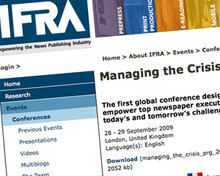
Newspapers should not focus on surveys before launching products, but instead arrange small gatherings of a few readers, Dr Rainer Esser advised delegates at the WAN-IFRA 'Managing the Crisis' conference in London.
"We don't believe in long surveys. We invite 10 or 20 readers and discuss [plans] with them," he said. Surveys only allow short answers not conducive to building new ideas, he added.
Rather than 'survey after survey, after survey' writers and editors should meet their readers at events and in their homes, he said. Newspapers should launch new projects before it's too late - without waiting for large-scale results, he added.
His view on assessing user behaviour was supported by Anna Kirah, design anthropologist, psychologist and vice-president CPH DESIGN 1 2 3, in Norway.
Newspapers should try and undertake in-depth studies, such as ethnographies, rather than issuing large surveys which are often ill-representative of users' real behaviour, she said.
Although advertising revenues are forecast to be down five per cent for the year ahead, sales revenues will be up overall at Die Zeit, Esser claimed, with distribution providing 55 per cent and advertising 45 per cent.
The reach of the newspaper is up 65 per cent in the period 2003-9, he said: sold circulation was 501,524 for 2009 and subscription 317,500.
The newspaper's readership is currently around 45 per cent female and strongest among the top-level German socio-economic groups.
It is this affluent and well-educated market it seeks to cater, from a young age, Esser explained.
"Our understanding of quality is what our readers decide to be quality; what our readers like to read we give them," he said.
It invests in its editors more than ever, he added. Although cuts were made to print operations, the title cut third-party services rather than its writers.
Its staff has undergone change, he said: "The people who write for Die Zeit are different from those who wrote for it 10 years ago."
Now it names doctors and scientists and more women among its journalists - from a greater variety of cultural backgrounds.
Free daily newsletter
If you like our news and feature articles, you can sign up to receive our free daily (Mon-Fri) email newsletter (mobile friendly).
Related articles
- Maria Ressa, executive editor of Rappler, receives Golden Pen of Freedom
- Taking a 'warmer approach': How Die Zeit is experimenting with its re-launched Instagram channel
- Die Zeit is using its Campus platform for students to get to know young readers better
- What can legacy publishers learn from digital pure players?
- Tip: Check out the top takeaways from last week's International Newsroom Summit









